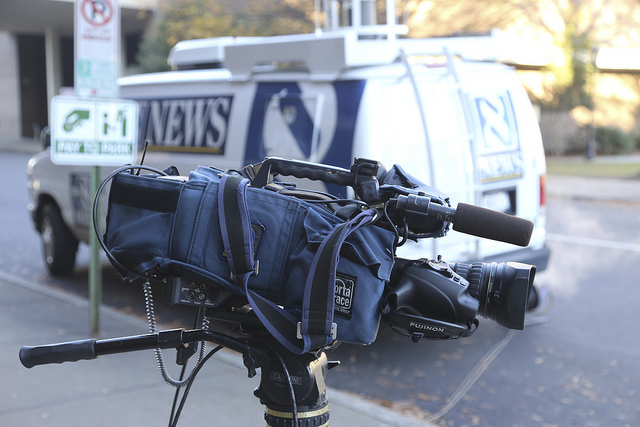
Earlier this year, Stephen Colbert triumphantly declared “the first real scandal” of the Obama administration after CNN reported that veterans had died while waiting for care in the Phoenix Veterans Affairs system. In a classic Colbert satire, he then ran through a laundry list of White House scandals: “I know I’ve cried wolf before, what with Benghazi and the IRS, and the AP and Fast and Furious and Solyndra and Obama’s uncle and Obama’s aunt and Obama’s birth certificate … . But this one is different. It’s backed up by eyewitnesses and documents and the betrayal of sick veterans. It’s like Christmas morning.”
Which scandals matter and deserve the hyper-attention of our 24-hour news cycle? In advance of the Zócalo “Has the Media’s Obsession With Scandal Ruined American Politics?”, we asked experts in political science and communications: What can the American media do to cover politics in a way that helps our democracy?

I strongly contest the notion that the media are obsessed with scandal. As my book Scandal and Silence (Polity Publishers, 2012) shows, the media neglect a vast range of potential scandals and only focus on a small percentage of them. And the media do cover some of those scandals more than is merited.
In general, the media do a mediocre job contributing to democracy, but it’s not because of scandal-mongering. Consider for instance their essentially unanimous determination in 2008 not to follow up on plausible information suggesting Senator John McCain committed multiple adulteries. I’m not saying journalists should have pursued this line of investigation. I’d prefer that the media ignore private, consensual sexual behavior. The problem is that sometimes they do, sometimes they don’t. It is this inconsistency—the massive attention to some politicians’ sexual peccadilloes and studious ignoring of others’—that damages democracy.
Ditto for financial improprieties: President Bill Clinton’s alleged business misdeeds garnered microscopic scrutiny, while other politicians’ were shrugged off–for instance George W. Bush’s admitted insider trading, proceeds of which he invested in the Texas Rangers, ultimately netting him disproportionate millions when the team sold. In this and other realms of leadership malfeasance, democracy would be nourished by more scandal reporting, not less.
Robert M. Entman is J.B. and M.C. Shapiro professor of media and public affairs and professor of international affairs at the George Washington University. His newest book is Scandal and Silence: Media Responses to Presidential Misconduct (Polity, 2012).

The media—a so-called “fourth branch of government”—has an obligation to remind us not of our partisan, ethnic, gender, or geographic identities, but of our democratic identity.
In Los Angeles, for instance, low voter turnout rates in municipal elections are not only a symptom of poor institutional design (timing of elections, ease of registration), but also general apathy. This apathy is a result of a seemingly endless line of political corruption, scandal, and betrayal as well as a general disconnect between the individual and the polity. While the media should report stories of scandal and corruption (see NYU journalism professor Jay Rosen’s thought experiment on how to report), the media should also act as a promoter of democratic culture. News coverage should not just center on the “how” and “why” of a particular story, but also remind citizens of the big picture: In a democracy, each of us has a duty to be active and engaged citizens. We otherwise diminish our democracy—and who we as individuals and as a society are—by taking our democratic rights for granted.
The media can remind us that we are democratic citizens and that even when we are immersed in issues that seemingly divide us, peaceful conflict is possible because we live in a democracy. Research also indicates that we make better political decisions when we are reminded of our democratic values.
In 1787 Thomas Jefferson said, “Were it left to me to decide whether we should have a government without newspapers, or newspapers without a government, I should not hesitate a moment to prefer the latter.” Now, as then, the media play a crucial role in creating and maintaining a healthy democracy.
Citizens today exhibit a decreased interest in “hard” news. And despite hopes that the Internet would be a democratizing force, evidence shows it to have little effect on mass-level political participation or civic engagement. The quantity of news and information has increased dramatically worldwide, but the media’s most important function remains in promoting a democratic culture.
Jennifer M. Ramos is associate professor of political science at Loyola Marymount University and visiting associate researcher at UC Irvine. Her recent books include Changing Norms through Actions: The Evolution of Sovereignty (Oxford UP) and iPolitics: Citizens, Elections and Governing in the New Media Era (Cambridge UP).

Media play an important role in democratic societies like the United States. They provide the primary means of communicating information that is relevant to political decision-making. The news is also a business with a highly competitive market. As a result, news features sensational stories to attract audiences and political scandals are a staple.
But are all scandals created equal? We investigated whether policy scandals are reported the same way as personal scandals. Our concern was that too much attention to individuals and sensational details in policy scandals might crowd out coverage of institutional failures and discourage efforts at political reform.
We analyzed the coverage of four scandals–Abu Ghraib, Benghazi, NSA surveillance and Edward Snowden, and military sexual assault. We found relatively uniform treatment of these scandals across news outlets. Although news attention was drawn to one or a few people in each of these scandals, the coverage focused on institutions as well.
Coverage of sexual assault in the military scandal was overwhelmingly (94 percent) attributed to the institution of the military rather than individual miscreants. Fifty-eight percent of Benghazi stories primarily attributed blame to institutions. With Abu Ghraib and the Snowden case, media coverage was fairly evenly split between institutions and individuals.
The media coverage of all the scandals was negative and sensational, but the level of sensationalism varied. Coverage of military sexual assault and Abu Ghraib, for example, was much more sensational than Benghazi and Snowden.
Only partisan media (such as Fox News) and overseas sources (such as the BBC and The Guardian) departed from the media consensus. Fox News coverage of Benghazi was much more sensational, while British news outlets blamed the scandal more often on NSA than the American media. The increased diversity of outlets provides Americans with a range of interpretations of these scandals. In the end, our research shows that media coverage of policy scandals includes institutions, and therefore, does not constitute a significant threat to American democracy.
Marion R. Just is a professor of political science and an associate of the Shorenstein Center on Media, Politics and Public Policy at the Harvard Kennedy School of Government. Ann N. Crigler is professor of political science at the University of Southern California.

News organizations are in a bit of a pickle. Their profit-maximizing business objective can conflict with their democracy-serving journalistic mission. Reporting on the latest celebrity scandal or inflaming partisan passions with extensive coverage of a political scandal can increase page views, and consequently advertising revenue. But do these stories serve a greater democratic purpose? That’s questionable.
News organizations must find ways to meet their journalistic mission and retain their commercial viability. Unfortunately, the most commonly used digital metrics neglect the noble democratic goals inherent in the journalistic enterprise.
In response to news audiences gravitating to digital platforms, many newsrooms have dedicated resources to improving their digital presence. At the same time, news revenues have declined, and news organizations face pressure to mind their bottom lines. Page views and unique visitors are important metrics because they affect online advertising rates. And advertising is the main source of revenue for news organizations. Identifying ways to increase page views and unique visitors, therefore, become important considerations for newsrooms.
Click-maximizing strategies, such as covering celebrities and partisan animosity, may be tempting. Yet in the long run, these stories undercut the reputation of the news media. Indeed, research confirms that these sorts of stories reduce public trust in the news media.
To address this situation, I would propose that we (a) work to identify techniques that advance both commercial and journalistic goals, (b) develop new tools and strategies for assessing democratic outcomes, and (c) use these tools to supplement the existing emphasis on commercial outcomes. By thinking more critically about both democratic and commercial outcomes, the news media will better serve democracy and, I believe, improve their long-term business success.
Natalie (Talia) Jomini Stroud is an associate professor of communication studies and the assistant director of research at the Annette Strauss Institute for Civic Life at the University of Texas at Austin. She directs the Engaging News Project, which researches commercially-viable and democratically-beneficial ways to improve online news.



